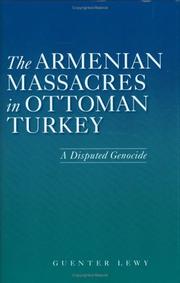| Listing 1 - 4 of 4 |
Sort by
|

ISBN: 1934548014 9781934548011 Year: 2008 Publisher: Dearborn: University of Michigan. Armenian Research Center,
Abstract | Keywords | Export | Availability | Bookmark
 Loading...
Loading...Choose an application
- Reference Manager
- EndNote
- RefWorks (Direct export to RefWorks)
Armenian massacres, 1894-1896 --- Armenians --- Turkey --- Armenia
Book
ISBN: 9780674247949 0674247949 Year: 2021 Publisher: Cambridge: Harvard University Press,
Abstract | Keywords | Export | Availability | Bookmark
 Loading...
Loading...Choose an application
- Reference Manager
- EndNote
- RefWorks (Direct export to RefWorks)
"Ümit Kurt explores causes and effects of the Armenian genocide in his hometown of Gaziantep, Turkey. He finds that local gentry and ordinary Turks were heavily motivated by the prospect of financial gain as Armenians were dispossessed. Newly enriched Turks then financed the young republic, elevating themselves to the status of a political elite"
Armenians --- Armenian massacres, 1894-1896. --- Abandonment of property --- Deportation --- History. --- Citizen participation. --- Gaziantep (Turkey) --- Economic conditions. --- Politics and government. --- Arméniens -- Gaziantep (Turquie) --- Arméniens, Massacres des (1894-1896) --- Abandon de biens -- Gaziantep (Turquie) --- Déportation -- Gaziantep (Turquie)

ISBN: 1607819619 9781607819615 0874808499 9780874808490 0874808901 9780874808902 Year: 2005 Publisher: Salt Lake City (Utah) University of Utah Press
Abstract | Keywords | Export | Availability | Bookmark
 Loading...
Loading...Choose an application
- Reference Manager
- EndNote
- RefWorks (Direct export to RefWorks)
Armenians --- Armenian Genocide, 1915-1923. --- Armenian massacres, 1909. --- Armenian massacres, 1894-1896. --- Armenian question --- Armenian massacres, 1915-1923 --- Genocide --- World War, 1914-1918 --- History. --- Atrocities --- Turkey --- Armenia --- History --- Armenian massacres, 1915-1923. --- Armenian massacres --- Arméniens --- Arméniens, Massacres des, 1894-1896. --- Arméniens, Massacres des, 1909. --- Génocide arménien, 1915-1916. --- Ludobójstwo --- Massaker. --- Mniejszości narodowe --- Ormianie --- Polityka narodowościowa --- Völkermord. --- Histoire. --- martyrologia --- Armenier. --- Arménie --- Osmanisches Reich. --- Turquie --- Histoire
Book
ISBN: 9780674504790 9780674915152 0674915151 0674504798 Year: 2016 Publisher: Cambridge, Massachusetts
Abstract | Keywords | Export | Availability | Bookmark
 Loading...
Loading...Choose an application
- Reference Manager
- EndNote
- RefWorks (Direct export to RefWorks)
"The Armenian Genocide and the Nazi Holocaust are often thought to be separated by a large distance in time and space. But Stefan Ihrig shows that they were much more connected than previously thought. Bismarck and then Wilhelm II staked their foreign policy on close relations with a stable Ottoman Empire. To the extent that the Armenians were restless under Ottoman rule, they were a problem for Germany too. From the 1890s onward Germany became accustomed to excusing violence against Armenians, even accepting it as a foreign policy necessity. For many Germans, the Armenians represented an explicitly racial problem and despite the Armenians' Christianity, Germans portrayed them as the 'Jews of the Orient.' As Stefan Ihrig reveals in this first comprehensive study of the subject, many Germans before World War I sympathized with the Ottomans' longstanding repression of the Armenians and would go on to defend vigorously the Turks' wartime program of extermination. After the war, in what Ihrig terms the 'great genocide debate,' German nationalists first denied and then justified genocide in sweeping terms. The Nazis too came to see genocide as justifiable: in their version of history, the Armenian Genocide had made possible the astonishing rise of the New Turkey. Ihrig is careful to note that this connection does not imply the Armenian Genocide somehow caused the Holocaust, nor does it make Germans any less culpable. But no history of the twentieth century should ignore the deep, direct, and disturbing connections between these two crimes. As Stefan Ihrig shows in this first comprehensive study, many Germans sympathized with the Ottomans' longstanding repression of the Armenians and with the Turks' program of extermination during World War I."
Armenian massacres, 1915-1923 --- Armenian massacres, 1894-1896 --- Armenian massacres, 1909 --- Armenians --- Genocide --- Racism --- Nazis --- Foreign public opinion, German --- Public opinion --- History --- Political aspects --- Philosophy --- Attitudes --- Germany --- Turkey --- Foreign relations --- Armenian Genocide, 1915-1923 --- National socialists --- Fascists --- Socialists --- National socialism --- Neo-Nazis --- Bias, Racial --- Race bias --- Race prejudice --- Racial bias --- Prejudices --- Anti-racism --- Critical race theory --- Race relations --- Cleansing, Ethnic --- Ethnic cleansing --- Ethnic purification --- Ethnocide --- Purification, Ethnic --- Crime --- Ethnology --- Indo-Europeans --- Armenian question --- World War, 1914-1918 --- Foreign public opinion, German. --- History. --- Atrocities --- Armenian massacres, 1915-1923 - Foreign public opinion, German --- Armenian massacres, 1894-1896 - Foreign public opinion, German --- Armenian massacres, 1909 - Foreign public opinion, German --- Armenians - Public opinion - History --- Genocide - Political aspects - Germany - History --- Genocide - Germany - Philosophy - History --- Racism - Germany - Philosophy - History --- Nazis - Attitudes - History --- Germany - Foreign relations - Turkey --- Turkey - Foreign relations - Germany
| Listing 1 - 4 of 4 |
Sort by
|

 Search
Search Feedback
Feedback About UniCat
About UniCat  Help
Help News
News